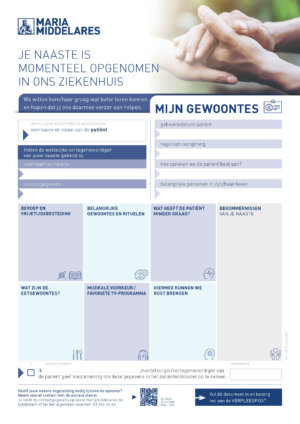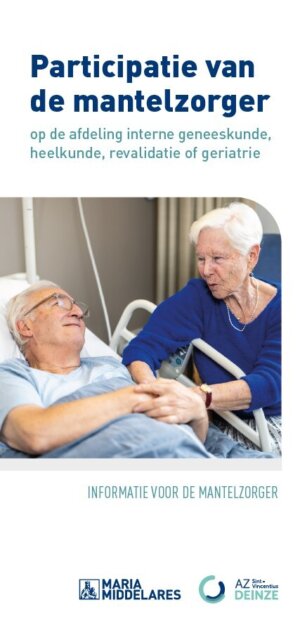Dementia: what next?
Being diagnosed with dementia has an impact on the life of the person with dementia as well as on the life of his/her informal carer on several levels. Many emotions, uncertainties and questions arise. As an informal carer, it is not always obvious to know how to handle this new situation and where to turn with your emotional and practical questions.
Dementia-friendly hospital
Dementia-friendly hospitalIn an effort to meet this as best as possible, our hospital made great efforts in the past and developed numerous initiatives that can provide a handhold for both the person with dementia and his/her informal carer. In this way, we strive to be a'dementia-friendly hospital' and also create or encourage a dementia-friendly environment outside the hospital.
We further explain the initiatives offered by our hospital here:
Cognufit!" is an individual rehabilitation programme developed for patients with dementia or memory problems and their informal carers.
The ultimate goal of this programme is to balance the carrying capacity and burden for the informal carer, set limits and goals, identify problems and look for solutions together.
After the doctor has made the diagnosis, the patient and his/her informal carer are invited for an appointment at the geriatric day hospital in AZ Maria Middelares Ghent. After an introductory talk by one of our staff members, the individual situation is outlined and any problems identified. Depending on the individual goals, one or more follow-up appointments (follow-up sessions) are scheduled with the appropriate disciplines:
- The speech therapy session includes explanation of communication, how to deal with changing behaviour, tips on diary use and memory aids.
- The occupational therapy session includes testing your physical condition, explanation of a safe living environment, how to prevent falls, tips on exercise, relaxation, ...
- The nurse will explain in her session about medication, body hygiene, healthy diet, dealing with the person with dementia, ...
- A session of the social service will give you more explanation on how to start home help or family help, where to find support, premiums you are entitled to, preparing an early care planning (living will), ...
Each carer is assigned a contact person who can be contacted every week.
At the end of the series, a report will be drawn up and forwarded to your GP. In consultation with the patient and the informal carer, arrangements will also be made with other organisations to ensure continuity of care.
You are not alone. We are here to help you!
If you have any questions, please contact us on 09 246 22 04 (day hospital geriatrics) or via cognufit@mijnziekenhuis.be.
Caring for a person with dementia and for yourself as an informal carer is not always obvious. Sooner or later, the informal carer often encounters various emotional and/or practical difficulties.
The psycho-education package "Dementia and now" was developed on the initiative of the Expertise Centre Dementia Vlaanderen vzw and the Alzheimer Liga Vlaanderen vzw. The programme is guided by people who have followed the "Dementia and now" coach training and consists of 10 meetings for the same group of up to 15 informal carers who care for someone with (young) dementia at home or outside. These sessions help the informal carer cope with and derive satisfaction from the sometimes challenging care situation.
During the sessions:
- you will learn more about dementia, its impact, how to cope and what support exists.
- learn how to better cope with your feelings, thoughts and care load.
- meet other carers who support and understand you and with whom you can exchange knowledge, insights and skills.
The price of 80 euros includes your participation in the 10 meetings and a copy of the book 'Dementia and nU' for informal carers.
The 'Dementia en nu' series is organised at both the AZ Maria Middelares Ghent site and the AZ Sint-Vincentius Deinze site.
When?
Check our calendar for the next series of classes and register.
Questions?
If you have any questions, please contact us at demnu@mijnziekenhuis.be or directly through one of our dementia coaches or dementia experts:
The dementia compass of the primary care zone Schelde en Leie helps carers and informal carers in their search for organisations offering help or treatment for people with dementia. Our hospital, with its dementia experts, supported by the geriatrics and neurology specialisations, responds to this demand for help.
You are a very important person for smooth care in the home environment but certainly also during hospitalisation. Indeed, when the person with dementia is accompanied during his/her hospitalisation by his/her informal carer, a familiar face, it can have a beneficial impact on the patient's confusion and agitation. Information about the habits and preferences of the person with dementia is very important for optimal approach and care during a stay in our hospital. As an informal carer, you are an indispensable link in the continuity of care for your loved one. Therefore, we would like to involve you in the following care aspects during your admission:
- Meal supervision (except in the case of swallowing disorders)
- Presence in case of agitation
- Presence in case of fall risk
- Presence in a palliative context
As an informal carer, you (especially at the beginning of the admission) know the person with dementia and his/her habits and customs better than the healthcare providers in the hospital. You can help us get to know your loved one better so that we can take maximum account of his/her daily habits during hospitalisation. This will help ensure a more pleasant and peaceful stay. Please download the 'My habits' document below, print it out and return it to the ward nurse. The document will then be hung up in the room.
Only available in Dutch:

Mijn gewoontes
DownloadIn exchange for your valuable contribution, you enjoy a number of benefits as a carer in our hospital. We offer you the opportunity to be present with your relative outside visiting hours. We will provide you with a badge that makes you recognisable (identifiable) as an informal carer. Moreover, as an informal carer, you can enjoy a free meal (breakfast, lunch and/or dinner) in your neighbour's room. Finally, as an informal carer, you enjoy a reduced parking rate.
Only available in Dutch:

Participatie mantelzorger
DownloadThe Flemish Expertise Centre Mantelzorg is a cooperation between the Flemish Mantelzorgplatform and SAM (Steunpunt Mens en Samenleving). It is one of the actions from the Flemish Government's mantel care plan.
At www.mantelzorgers.be you will find tailored information.
Ghent wants to be a dementia-friendly city. The dementia open house is open to anyone with questions about dementia.
AZ Maria Middelares is a partner of the dementia open house. After all, warm care for people with dementia and their informal carers is our priority. Know that you can also always contact your doctor or our dementia coaches for questions.
Something wrong or unclear on this page? Report it.








